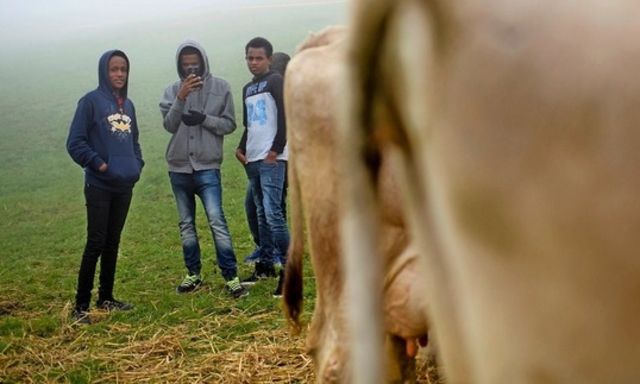Date: Friday, 04 May 2018

Misty views: Eritreans visit the 2016 traditional cattle show in Trogen AR. Photo: Gian Ehrenzeller (Keystone)
Hardly anyone waited for this letter. The State Secretariat for Migration (SEM) is currently reviewing the provisional admission of 3,200 Eritreans - and has already informed some of them in writing that they are losing their residence status and need to return to their homes. This is what the "Rundschau" of Swiss television reported recently. A total of 9400 Eritreans live in Switzerland for the time being.
The reason for the nationwide review is a tightening of practice from 2016. Eritreans who have left behind the National Service or have not even started, have not recognized Switzerland as a refugee since then . Instead, they only receive the provisional admission. At the same time the SEM decided at that time that with Eritreans a rejection is no longer generally unacceptable. The Federal Administrative Court confirmed this assessment in a ruling in 2017.
Just last year, just 29 Eritreans left Switzerland. Another 13 people returned directly to Eritrea.
However, as the SEM suggests, only a fraction of all 3200 people are likely to lose their residence status. At least earlier cases suggest that. "According to experience, it is well below 10 percent, in which the provisional admission can actually be lifted," says SEM spokesman Daniel Bach. Last year, the Confederation made 1218 reviews; only 52 people have lost their status. They came mainly from Kosovo, Serbia and Sri Lanka.
Numerous obstacles
Why this low number? According to Bach, the federal government comes to the conclusion in the majority of cases that a rejection continues to be unreasonable. This may be because there is a situation of general violence in the home country or the necessary medical care is not available. In other cases a rejection would be "not proportionate". For example, because the person lives in Switzerland for several years and their children go to school here.
In a pilot project, the SEM is now examining 200 dossiers of Eritreans who, because of their age, no longer have to worry about being drafted into the national service. For them, the likelihood of ending their status is naturally higher. The results of the pilot project are expected to be available in mid-2018 and will "feed into the decision-making process on how to proceed", as the SEM informs. Among other things, it is about how many resources are needed for the review of the remaining dossiers.
However, the removal of a provisional admission does not necessarily mean that the person is actually leaving: Eritrea does not accept forced evictions. Therefore, the only thing the cantons are left with is the cancellation of social assistance. The victims then receive only emergency aid, so something to eat and a roof over his head. As the numbers show, the voluntary exits of Eritreans are modest: last year just 29 Eritreans left Switzerland. Another 13 people returned with the return assistance directly to Eritrea.
Much bureaucracy for nothing?
The Swiss Refugee Agency therefore criticizes the fact that the termination of the provisional admission only leads to more people being dependent on emergency aid. For SP National Council Cédric Wermuth the review of a "bureaucratic self-employment" equals. "The situation in Eritrea has not changed fundamentally since 2016." The country continues to rule unjustly, so few people can be sent back. Wermuth considers the tightening of asylum practice to be "a political decision" that stands on shaky ground.
The Bernese SVP councilor Sabina Geissbühler sees it completely differently. She traveled to the East African country in 2017 to get an idea of the situation. The national service is not forced labor, but in most cases a state-mandated job, says Geissbühler. "Military training lasts half a year; then only 20 to 30 percent have to go to community service or to the military. "Switzerland could therefore return all 3,200 provisionally admitted persons to Eritrea, but on one condition: the UN Security Council must ensure that the neighboring state of Ethiopia complies with the peace agreement so that the People could live without fear.